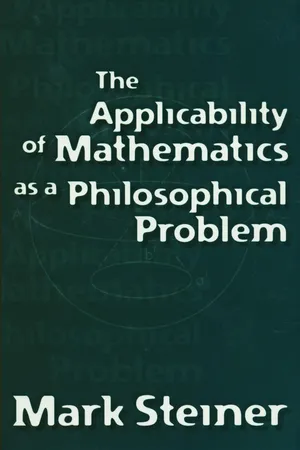
- English
- PDF
- Available on iOS & Android
The Applicability of Mathematics as a Philosophical Problem
About this book
This book analyzes the different ways mathematics is applicable in the physical sciences, and presents a startling thesis--the success of mathematical physics appears to assign the human mind a special place in the cosmos.
Mark Steiner distinguishes among the semantic problems that arise from the use of mathematics in logical deduction; the metaphysical problems that arise from the alleged gap between mathematical objects and the physical world; the descriptive problems that arise from the use of mathematics to describe nature; and the epistemological problems that arise from the use of mathematics to discover those very descriptions.
The epistemological problems lead to the thesis about the mind. It is frequently claimed that the universe is indifferent to human goals and values, and therefore, Locke and Peirce, for example, doubted science's ability to discover the laws governing the humanly unobservable. Steiner argues that, on the contrary, these laws were discovered, using manmade mathematical analogies, resulting in an anthropocentric picture of the universe as "user friendly" to human cognition--a challenge to the entrenched dogma of naturalism.
Frequently asked questions
- Essential is ideal for learners and professionals who enjoy exploring a wide range of subjects. Access the Essential Library with 800,000+ trusted titles and best-sellers across business, personal growth, and the humanities. Includes unlimited reading time and Standard Read Aloud voice.
- Complete: Perfect for advanced learners and researchers needing full, unrestricted access. Unlock 1.4M+ books across hundreds of subjects, including academic and specialized titles. The Complete Plan also includes advanced features like Premium Read Aloud and Research Assistant.
Please note we cannot support devices running on iOS 13 and Android 7 or earlier. Learn more about using the app.
Information
Table of contents
- Contents
- Acknowledgments
- Introduction
- 1. The Semantic Applicability of Mathematics: Frege’s Achievements
- 2. The Descriptive Applicability of Mathematics
- 3. Mathematics, Analogies, and Discovery in Physics
- 4. Pythagorean Analogies in Physics
- 5. Formalisms and Formalist Reasoning in Quantum Mechanics
- 6. Formalist Reasoning: The Mystery of Quantization
- Appendix A: A “Nonphysical” Derivation of Quantum Mechanics
- Appendix B: Nucleon–Pion Scattering
- Appendix C: Nonrelativistic Schroedinger Equation with Spin
- References
- Index